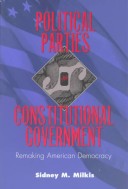Interpreting American Politics
1 total work
The US Constitution makes no mention of political parties, yet they began to form shortly after its ratification. This text explores the uneasy relationship betwee the Constitution and the party system to advance the argument that parties arose as part of a deliberate programme of constitutional reform. The author shows that, forged on the anvil of Jeffersonian and Jacksonian democracy, parties initially formed as decentralized political associations that engaged the attention of ordinary citizens and held presidents accountable to local constituencies. As the power of the presidency and the federal government grew, parties shifted their attention from building political support in the states and localities to vying for control over national administration and, in the process, lost their vital connection to the electorate. With the decline of localized parties, Sidney Milkis concludes, there has arisen an administrative politics of rights and entitlements that belittles the efforts of Democrats and Republicans alike to define a collective purpose.
Ending with a discussion of possible methods of revitalization and reform, the book seeks to explain the reasons behind Americans' disenchantment with parties and the party system.
Ending with a discussion of possible methods of revitalization and reform, the book seeks to explain the reasons behind Americans' disenchantment with parties and the party system.
